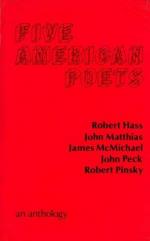|
This section contains 2,694 words (approx. 9 pages at 300 words per page) |

|
SOURCE: "Contemporary Poetics and History: Pinsky, Klepfisz, and Rothenberg," in The Kenyon Review, Vol. XIV, No. 1, Winter, 1992, pp. 171-88.
In the following excerpt from a review in which he examines Pinsky's The Want Bone, Irena Klepfisz's A Few Words in the Mother Tongue (1990), and Jerome Rothenberg's Khurbn, and Other Poems (1989), McCorkle discusses the ways in which Pinsky engages public and political issues in his poetry.
Typical of discussions of poetry and politics, and the larger domain of history, is a sense of the necessity or decorum to maintain a division between poetry and the other two areas. The popularization of Adorno's question—can there be poetry after Auschwitz—has further mediated the reception of contemporary poetry, if not the very moment of poesis. Equally prevalent is the argument, generous in some ways, that all poetry is political. Carolyn Forché, in her essay, "El Salvador: An Aide Memoire," writes...
|
This section contains 2,694 words (approx. 9 pages at 300 words per page) |

|


